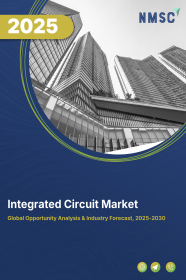
Integrated Circuit (IC) Market by Type (Analog IC, Digital IC, Mixed Signal IC and Others), by Packaging (Surface Mount Technology (SMT) Packaging, Chip Packaging, Dual-Chip Packaging and Others), by Technology (MOS (CMOS, PMOS, NMOS), BJT, BiCMOS, FinFET, and Others), and by Application (Consumer Electronics, Automotive, IT and Telecommunication, Healthcare, Aerospace and Defence, and Others)–Global Opportunity Analysis and Industry Forecast 2025-2030
US Tariff Impact on Integrated Circuit Market
Trump Tariffs Are Reshaping Global Business
Integrated Circuit Market Overview
The global Integrated Circuit (IC) Market overview size was valued at USD 685.01 billion in 2024 and is predicted to reach USD 1438.42 billion by 2030 with a CAGR of 13.2% from 2025-2030.
The factors such as government subsidies and incentives, advancements in technology and expanding global healthcare industry drives the market growth. However, the high manufacturing cost inflates the price of integrated circuit and chips. On the contrary, growing demand for 5G and 5.5G offers promising future opportunity to enhance the requirement of high-speed data.
Moreover, the top players namely Qualcomm, Samsung and others are taking initiatives involving product launch and collaborations in order to enhance their market position and expand product offerings. These initiatives are expected to drive innovations and adoption in IC market, creating a secure and efficient digital ecosystem. Advancements in AI/ML and IoT are enabling advanced systems to be integrated in 5G compatible appliances, and as the market matures, demand for integrated circuit is expected to grow steadily.
Government Incentives Boosts the Market Growth
The rise in government support including subsidies, tax incentives, and funding for research initiatives propels the increasing need for ICs worldwide as such steps promote innovation and accelerate the development of advanced IC technologies. According to reports published by the Press Information Bureau, (PIB) on 2024, India is improving its IC industry through Tata Semiconductor's USD 31.80 billion that plans to manufacture as many as 48 million chips per day by 2025.
In addition, the Center for Strategic & International Studies states that, Russia is investing USD 2.54 billion in 110 R&D projects for domestic integrated circuit-making, with plans to produce 90nm chips by year-end and reach 14nm by 2030, aiming for technological independence. The government across the world is boosting semiconductor growth through investments and partnerships for innovation, thereby driving the integrated circuit (IC) market growth.
Technology Advancement in IC Propels the Market Growth
The advancement in technology fuels the growth of the global integrated circuit market with the higher need for faster, smaller and more efficient chips. Advances in artificial intelligence and the internet of things accelerate this requirement and promote the growth of the IC industry.
For example, in July 2024, Qualcomm launched affordable 5G smartphones to extend access to 5G and encourage 4G users to upgrade. These advancements drive the need for smaller, faster, and more efficient IC, fuelling growth in the industry and supporting global progress.
Demand For Advanced Diagnostic Gadgets Heightens Up the Market Growth
The expanding global healthcare industry is driving the integrated circuit market demand due to its application in sophisticated medical devices such as diagnostic tools, imaging systems, and patient monitoring devices, that utilize efficient, compact, and trustworthy ICs.
According to the Organisation for Economic Co-operation and Development (OECD) report 2022, the rise in healthcare spending to an average of 9.1% of GDP in OECD nations in 2021 directly reflects the demand for advanced technologies such as ICs. Increasing healthcare costs generate a demand for innovative semiconductor supply chains in diagnostic tools, wearable technology, and telehealth solutions.
High Manufacturing Cost Hinders Market Growth
High manufacturing cost hinder the IC market expansion that makes it harder for companies to invest in new technology and expand production. This slows down innovation and limits their ability to meet the growing demand for advanced chips, that affects overall industry growth.
Use of ICs in Advanced Generation System Create Future Opportunity
The increasing demand for faster, more efficient 5G networks is pushing improvements in integrated circuit (IC) technology. With the introduction of 5G-Advanced (5.5G), ICs must meet the need for higher data speeds, less delay, and more efficient network performance. These innovations are essential for the development of next-generation communication systems. These advancements are key to meeting the demands of modern communication systems.
Market Segmentations and Scope of the Study
The integrated circuit market report is segmented on the basis of type, packaging, technology, application and region. On the basis of type, the market is divided into analog IC, digital IC and mixed signal IC, and others. On the basis of packaging, the market is divided into surface mount technology (SMT) packaging, chip packaging, dual-chip packaging, and others. Based on technology, the market is divided into MOS, BJT, BiCMOS, FinFET and others. Moreover, the MOS is further classified into CMOS, PMOS, and NMOS. Based on application, the market is segmented into consumer electronics, automotive, IT and telecommunication, healthcare, aerospace and defence and others. Regional breakdown and analysis of each of the aforesaid segments includes regions comprising of North America, Europe, Asia-Pacific, and Rest of The World (Row).
Geographical Analysis
The Asia-Pacific region dominates the integrated circuit market share during the forecast period, this is attributed to the technological advancements in automation, electric vehicles, and 5G are fuelling the demand for ICs in the region. As semiconductors are the foundational materials for ICs, their roles are deeply interconnected in modern electronics.
As per report published by DIGI Taiwan on 2024, Taiwan launched a chip-based Industrial Innovation Program with USD 9.27 billion in funding over next 10 years. These advancements are driving the growing demand for IC, with new initiatives aimed at strengthening leadership in ICs innovation and market dominance.
Moreover, the increase in government support through schemes namely PLI (Production Linked Incentive) in the region is boosting healthcare sector growth due to the application of ICs in modern medical devices for advanced treatments, that in return is surging the integrated circuit sector. As per NITI Ayog report 2022, India is expected to see an 80% rise in investment in digital healthcare tools by the year 2029. This growth, supported by government initiatives, is driving advancements in medical devices, that rely on ICs. The IC industry plays a key role as ICs are essential for modern medical equipment.
On the other hand, North America is expected to witness a steady growth in the integrated circuit industry during the forecast period as ICs are an essential part of modern defence devices and tools that is strengthening the defence sector in the region.
For instance, in September 2024, Intel is investing USD 3.00 billion to manufacture military-grade chips in the U.S., aimed at enhancing defence systems. These chips, essential for advanced military technologies, will improve the performance and security of critical defence applications. This move strengthens the U.S. defence industry’s reliance on high-performance IC to support national security.
Furthermore, the growth of government investments in the region particularly in sectors such as, semiconductors, is driving the expansion of the integrated circuit industry. According to reports published by ITA Canada in 2024, the Canadian government invested approximately USD 83.4 million in 2024 to expand its semiconductor industry, aiming to strengthen the integrated circuits (IC) market that boosts the R&D in semiconductor technologies, driving innovation and enhancing Canada’s competitiveness in the global landscape.
Competitive Landscape
Various key market players operating in the integrated circuit industry includes Intel Corporation, Qualcomm Technologies, Inc., Samsung Electronics Co. Ltd., Siemens AG, MediaTek, Texas Instruments Incorporated, Renesas Electronics Corporation, Sony Semiconductor Solutions Corporation, NXP Semiconductors, Toshiba Electronic Devices & Storage Corporation, Hangzhou Silan Microelectronics Co., Ltd, Semiconductor Components Industries, LLC, IBS Electronics, Inc., Nexperia, Microchip Technology Inc. and others. These market players are adopting strategies such as product launch and collaboration to remain dominant in the market.
For instance, in October 2024, Qualcomm partnered with Google on advanced mobile technologies, artificial intelligence-powered experiences, and integrated circuits for next-generation devices.
The corporation consisted of technologies as varied as Qualcomm's best-in-class 5G, artificial intelligence, mobile computing, and semiconductor technologies, while Google brought out its novelty in software, its cloud service offerings, and artificial intelligence.
Moreover, in November 2024, Samsung launched the NRD-K chipset, focusing on technologies such as AI, 5G, and automotive semiconductors. This development aims to increase requirement for advanced integrated circuits (ICs), strengthening Samsung’s role as a global leader in the semiconductor market while contributing to the overall growth of the IC industry.
Key Benefits
-
The report provides quantitative analysis and estimations of the integrated circuit market from 2025 to 2030, which assists in identifying the prevailing industry opportunities.
-
The study comprises a deep-dive analysis of the current and future integrated circuit market trends to depict prevalent investment pockets in the industry.
-
Information related to key drivers, restraints, and opportunities and their impact on the integrated circuit market is provided in the report.
-
Competitive analysis of the key players, along with their market share is provided in the report.
-
SWOT analysis and Porters Five Forces model is elaborated on the study.
-
Value chain analysis in the market study provides a clear picture of roles of stakeholders.
Integrated Circuit Market Key Segments
By Type
-
Analog IC
-
Digital IC
-
Mixed Signal IC
-
Others
By Packaging
-
Surface Mount technology (SMT) packaging
-
Chip packaging
-
Dual Chip packaging
-
Others
By Technology
-
MOS
-
CMOS
-
PMOS
-
NMOS
-
-
BJT
-
BiCMOS
-
FinFET
-
Others
By Application
-
Consumers
-
Automotive
-
IT and Telecommunication
-
Healthcare
-
Aerospace and defense
-
Others
By Region
-
North America
-
The U.S.
-
Canada
-
Mexico
-
-
Europe
-
The U.K.
-
Germany
-
France
-
Italy
-
Spain
-
Denmark
-
Netherlands
-
Finland
-
Sweden
-
Norway
-
Russia
-
Rest of Europe
-
-
Asia-Pacific
-
China
-
Japan
-
India
-
South Korea
-
Australia
-
Indonesia
-
Singapore
-
Taiwan
-
Thailand
-
Rest of Asia-Pacific
-
-
Rest of the World (RoW)
-
Latin America
-
Middle East
-
Africa
-
Key Players
-
Intel Corporation
-
Qualcomm Technologies, Inc.
-
Samsung Electronics Co. Ltd
-
Siemens AG
-
MediaTek
-
Texas Instruments Incorporated
-
Renesas Electronics Corporation
-
Sony Semiconductor Solutions Corporation
-
NXP Semiconductors
-
Toshiba Electronic Devices & Storage Corporation
-
Hangzhou Silan Microelectronics Co., Ltd
-
Semiconductor Components Industries, LLC
-
IBS Electronics, Inc.
-
Nexperia
-
Microchip Technology Inc.
REPORT SCOPE AND SEGMENTATION:
|
Parameters |
Details |
|
Market Size in 2024 |
USD 685.01 Billion |
|
Revenue Forecast in 2030 |
USD 1438.42 Billion |
|
Growth Rate |
CAGR of 13.2% 2025 to 2030 |
|
Analysis Period |
2024–2030 |
|
Base Year Considered |
2024 |
|
Forecast Period |
2025–2030 |
|
Market Size Estimation |
Billion (USD) |
|
Growth Factors |
|
|
Countries Covered |
28 |
|
Companies Profiled |
15 |
|
Market Share |
Available for 10 companies |
|
Customization Scope |
Free customization (equivalent to up to 80 working hours of analysts) after purchase. Addition or alteration to country, regional, and segment scope. |
|
Pricing and Purchase Options |
Avail customized purchase options to meet your exact research needs. |

















 Speak to Our Analyst
Speak to Our Analyst




















